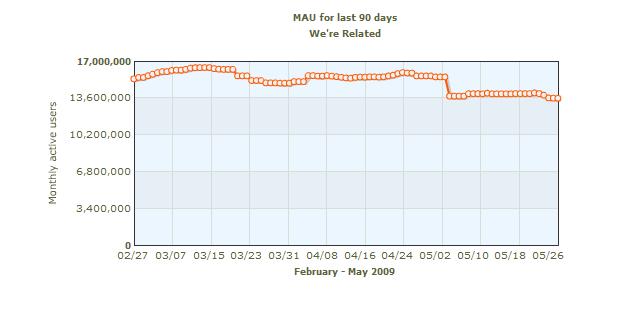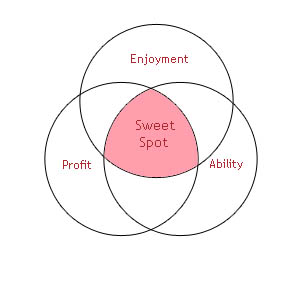I recently attended the National Genealogical Society conference in Raleigh, North Carolina, where I was able to meet with several genealogical companies, and socialize with a few acquaintances. One of the items that was consistently brought up was the success of FamilyLink’s “We’re Related” Facebook application. It was mentioned that they’d had an incredible success story with their introduction of this application on Facebook. That made me wonder as to the viability of marketing using Facebook, so I picked up a copy of Facebook Marketing by Steven Holzner, and sat down to read it this past weekend.
The book itself delves long into the actual workings of Facebook, taking the reader through the steps of targeting your profile, Facebook groups, creating pages, hosting Facebook events, etc. It quickly became clear to me that the back cover of the book says it well “traditional marketing methods won’t work here.”
Which marketing methods work there, are very little. It’s probably the reason why Facebook is struggling to gather income from its own internal marketing methods. The members of Facebook are using the site for entertainment and socializing purposes and they don’t want to be interrupted by advertisements. In fact, in reviewing several widely commented applications, some members appear to be almost hostile in receiving what they deem as “spam” and marketing. The reason? The spam and marketing messages make the usage of Facebook not fun.
So the crutch is how to make your marketing attempts at Facebook useful and fun for the users, while still getting your marketing message across? In that one sentence, I’ve saved you a lot of time in reading this book. Steven, the author, goes about detailing the minute features of Facebook, often simply copying and pasting the very help sections of Facebook into the manuscript. And these minute details take up a whole lot of space and your time, if you even read them. But the point he is trying to get across is valid, and very important.
So what methods does Steven suggest you use, to get your marketing out? In order to find that out, read the book… However, I will share some of my own findings while working with Facebook:
1) If you can develop an application which interacts with your existing website, then this is likely the best marketing method for you. But be prepared to support it. You get one good chance to impress the Facebook audience with your application… don’t blow it.
Make your application fun or useful, better yet, make it fun and useful! Be attentive to the users of your applications. Have somebody constantly monitoring the comments for your application page, and have them respond immediately to all comments. Don’t have the manpower to allow this? Then reconsider creating an application.
2) Facebook does have advertising methods. At a minimal $5 a day, and no commitment time, this is quite affordable for most marketers. This is also a more traditional source of advertising for companies unfamiliar with social marketing. However, as much as I enjoy clicking an ad just to see the marketing pitch, I’ve yet to do so at Facebook. Yep, not one ad clicked. The good thing with this method, is you can opt to pay by click… so at least if nobody clicks, you don’t pay.
3) Socialize. Find groups that interest you and socialize with them. This is what Facebook is about. Be prepared to give a lot of time and effort into an unproven method of marketing though. Once you have established yourself in the Facebook community as an active, trusted user, you can then spin some marketing messages out in your socializing. As an over-worked, unable-to-manage-my-time effectively, webpreneur though, I really don’t want to market in this method. Especially since the overall success is in doubt.
All in all, the book, Facebook Marketing, was an easy read. But it lacked substance, not because Steven was unable to articulate the methods he suggests you use for marketing with Facebook, but from the fact that there are so little marketing methods possible with Facebook at this time. Steven wrote a very detailed analysis of what one would expect if they had read a Facebook Guide. In fact, that might be a better title for the book: A “Facebook Guide – with marketing tips thrown in!”
Whilst browsing Facebook this weekend, I took a more careful look at the “We’re Related” Facebook application. If you browse the Facebook Applications I found that the “We’re Related” application was first on the page, even though it has only 2 stars. It makes me wonder if developers can pay additional monies for a better ranking to get themselves position higher? The “Verified Application” button that accompanies many applications, does get them listed higher in the ranks, and does cost the developers money… while at the same time, it appears to have little or no weight on the actual effectiveness of the application, regardless of Footnote’s claim to the contrary.
The We’re Related application currently has 13,492,725 monthly active users. While quite effective, earlier in the year it was approaching 17 million monthly users… the recent drop may be in part that like most family tree’s, once the data is entered, there’s little to be done for the casual user (the fun has worn off), and the fact that increasingly the application has become very buggy. While changes are being made to the application regularly, the developers seem to be making the changes they feel are needed, instead of listening to their users… this has the effect of upsetting many current users.
The App Data for We’re Related shows that they lost almost 3 million users over a 2 day period at the beginning of May. This may be in part to the buggy nature of the application.
We’re Related Application Data
It is apparent by the success of We’re Related that a well conceived application which takes advantage of the social tools which Footnote presents can do well. What isn’t known however, is how successful has this been for FamilyLink in promoting their family of websites, and has it been cost effective? Before I’d want to delve into developing an application I’d like to have a blueprint established for profitability. How about you?

